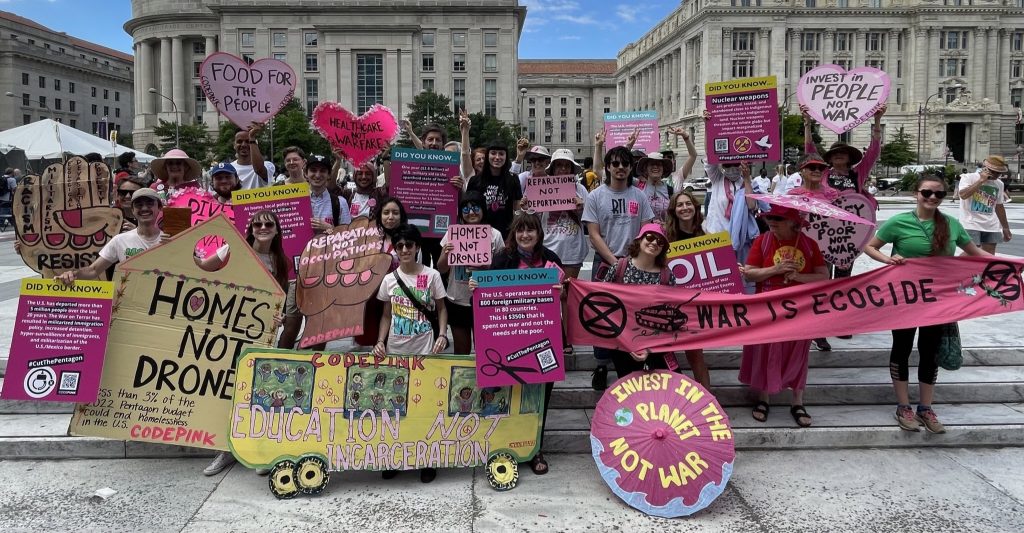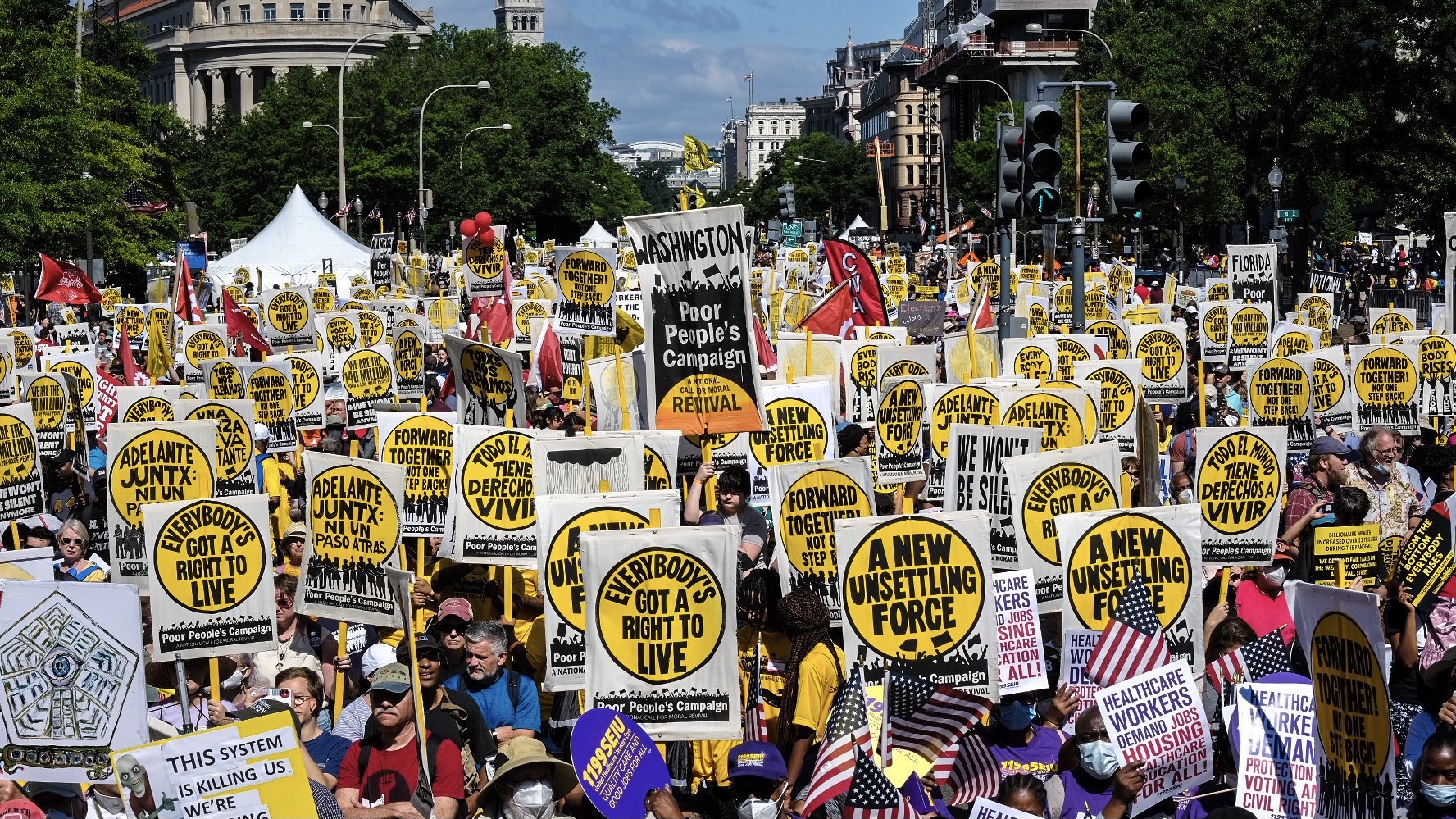Thousands of people gathered in the US capital of Washington DC on June 18 to participate in the ‘Poor People’s and Low-Wage Workers’ Assembly and Moral March on Washington and to the Polls’. The action was organized by the Poor People’s Campaign (PPC) to address a broad range of interconnected issues affecting the country’s 140 million poor and low wealth people– including access to health care and housing, systemic racism, the climate crisis, and rising militarism.
The PPC was joined by labor unions, religious organizations, and several climate action, human rights, and civil society groups. The rally took place over 50 years since the PPC was first founded and organized by civil rights leader Dr. Martin Luther King Junior, shortly before his assassination.
Speaking before the gathering on Saturday, Reverend Dr. Bernice A. King stated, “54 years ago my father launched the Poor People’s Campaign to revolutionize the economic landscape of our nation. Unfortunately Dr. Martin Luther King Jr. did not live long enough to see it come to fruition.”
“However, on June 19th, 1968 my mother Coretta Scott King was here in the nation’s capital,” King proclaimed, “to deliver a very powerful message on poverty…she made the appeal that poverty is not only a longstanding evil of this nation, but an actual act of violence against the dignity, livelihood, and humanity of its citizens.”
Poor in the US under attack
Before COVID-19, according to the PPC, an estimated 250,000 people died each year in the US from poverty and inequality. The pandemic exacerbated existing social and economic inequalities, with deadly consequences for already marginalized and vulnerable communities. In a report released in April, the PPC found that people in poorer counties died at a rate upto five times higher than their counterparts in wealthier counties.
“We know this can’t be simply explained by way of vaccination results, its related to the discrimination in our policy towards poor and low-wealth people,” said Reverend Dr. William J. Barber II, the co-chair of the Campaign. Counties classified as the poorest in the report had more than half of their population in poverty, and people of color were over-represented. The rates of people without insurance were twice as high as compared to the counties with the highest median incomes.
“The regressive policies that produce 140 million poor and low wealth people are not benign. They are forms of policy murder,” added Barber. It is important to note that this figure includes 43% of all adults, 52% of children, and 73% of women in the US.
“It does not have to be this way!”
Thousands of poor and working people out in the streets today in D.C. at the moral march on Washington with @UniteThePoor demanding that we fight poverty, not the poor. pic.twitter.com/ygK1nvDZha
— Party for Socialism and Liberation (@pslweb) June 18, 2022
Prior to the pandemic, 28 million adults in the US did not have health insurance. An additional 9 million people lost insurance after losing their jobs due to COVID-19. The drastic extent to which the lack of health insurance impacted the lives of people during COVID-19 was quantified in a recent study published in Proceedings of the National Academy of Sciences USA. Researchers found that from the beginning of the pandemic until March 2022, universal health care could have saved the lives of 338,000 people from COVID-19 alone.
#MedicareforAll because health care is a human need and a matter of survival. We’re proud to stand with @UniteThePoor today calling for a moral agenda that includes Healthcare for All! #M4A #PoorPeoplesCampaign pic.twitter.com/E4btXPMRj9
— NC Medicare for All Coalition: NCM4A (@Ncm4A) June 18, 2022
52 million people in the US, especially in the Southern states, are working for less than $15 an hour. Meanwhile, in May, the price of a gallon of gas exceeded the federal minimum wage in several areas. Fed up with government inaction and corporate greed at a time when working conditions were quite literally life threatening, workers across the US led a historic wave of strike actions and protests in 2021.
A giant 1199 purple of 1199ers landed in Washington DC, joining the @poorpeoplescampaign to call for policies that uplift low income Americans and address social, economic and racial justice! #buildpower #unionistheanswer pic.twitter.com/gzD1hD1fQg
— 1199SEIU 🫶 Healthcare Workers (@1199SEIU) June 18, 2022
Millions across the US are also facing housing insecurity, at a time when states are pushing to criminalize homelessness. Rents are also rising sharply amid a 40 year peak in inflation. A US Census Household Pulse Survey found that 8.8 million people were behind on rent payments from April 27 to May 9, 2022. Once again, people of color and low income households are particularly vulnerable.
Poverty is violence! Proud to be here here with @UniteThePoor at the #PoorPeoplesCampaign Moral March to fight for economic justice. pic.twitter.com/dk1XldcSNb
— HRC Greater Washington DC (@HRCGreaterDC) June 18, 2022
Before the pandemic, 53 cents of every federal discretionary dollar was diverted towards the military, and only 15 cents were put towards anti-poverty programs. According to anti-war grassroots organization CODEPINK, since the start of the pandemic, the US government’s expenditure on nuclear weapons has been 7.5 times higher than its support for global medical needs.

Now is not the time for silence!
“Such is the time now for a mass moral meeting in the streets…we can’t be silent anymore!,” stated Rev. Barber. “This is a movement until children are protected, until sick folk are healed, until low wage workers are paid, until immigrants are treated fairly, until affordable housing is provided, until the atmosphere, the land, and the water are protected,” he added.
Speakers also highlighted other pressing issues including racism within the criminal justice system, the curtailing of reproductive health care and abortion rights, and the ongoing theft and destruction of Indigenous lands.
In the face of the rising attack on the poor and working class masses across the US, the Poor People’s Campaign has also called for the implementation of a Third Reconstruction Agenda, following the First Reconstruction after the Civil War and the Second Reconstruction during the civil rights movement. On May 20th, the PPC joined lawmakers Pramila Jayapal and Barbara Lee as they presented the ‘Third Reconstruction: Fully Addressing Poverty and Low Wages From the Bottom Up’ congressional resolution.
“It reflects an omnibus vision to restructure our society from the bottom up, recognizing that in order to build a true Third Reconstruction, we must simultaneously deal with the interlocking injustices of systemic racism, poverty, ecological devastation and the denial of health care, militarism, and the distorted moral narrative of religious nationalism that blames the poor instead of the systems that cause poverty,” stated the PPC.
Thousands are here for the #MoralAssembly2022 with @UniteThePoor! pic.twitter.com/LuK0s5hsDj
— Guthrie Graves-Fitzsimmons (@GuthrieGF) June 18, 2022
The Campaign has also focused its efforts on mobilizing poor and low wealth people against voter suppression, including attacks on the Voting Rights Act. According to the PPC, poor and low-income people account for one third of the electorate. Almost 20 states across the US passed laws in 2021 to curtail voting rights in one form another, affecting an estimated 55 million people.
Ahead of the mid-term elections in November, the PPC has put forth a series of demands, including that Congress publicly acknowledge “the reality and pain of 140 million poor and low wealth people,” and that it commit to creating and supporting legislation that reflects the Third Reconstruction Agenda. It has also called upon President Joe Biden to host a White House Poverty Summit and to commit to an Executive Action Plan to Eliminate Poverty in 2022.
The PPC has also announced another mass mobilization in Washington DC in September, to join 5,000 poor and low wealth people and religious leaders along with 100 economists in “nonviolent moral direction action.” It has also launched a 143-day countrywide effort to register and educate poor and low-income communities to vote in every election for candidates who will commit to a Third Reconstruction Agenda.





